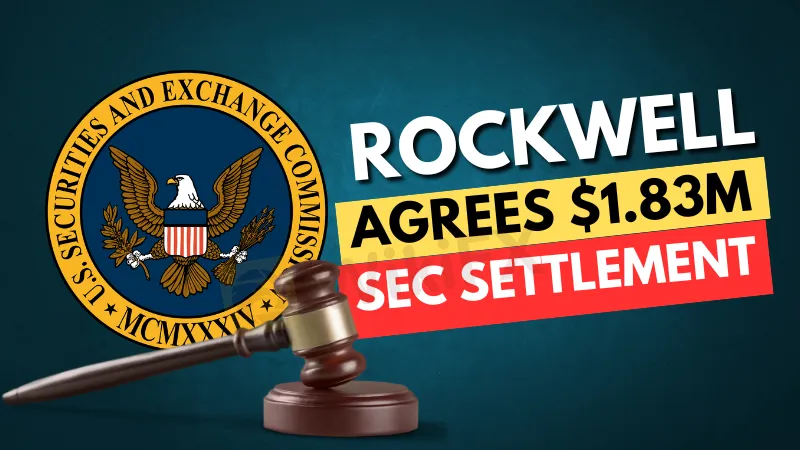简体中文
繁體中文
English
Pусский
日本語
ภาษาไทย
Tiếng Việt
Bahasa Indonesia
Español
हिन्दी
Filippiiniläinen
Français
Deutsch
Português
Türkçe
한국어
العربية
Rockwell Agrees $1.83M SEC Settlement
Abstract:SEC settles for $1.83 million with Brian Sewell and Rockwell Capital over a fraudulent scheme involving 15 students and the non-existent Rockwell Fund.

The US Securities and Exchange Commission settled with Brian Sewell and Rockwell Capital Management for $1.83 million after accusing Sewell of defrauding 15 students of $1.2 million. The case has brought attention to the risks associated with cryptocurrency investments, especially when they come with unverified claims of cutting-edge trading strategies.
The issue originates from Sewell's establishment of the American Bitcoin Academy, an online course that claimed to teach students the subtleties of bitcoin trading. In early 2018–mid-2019, hundreds of his students believed in the Rockwell Fund. This hedge fund was projected to be a game-changing investing platform that would leverage AI and crypto-asset trading algorithms to generate high profits for its investors.
However, the SEC's inquiry into these assertions revealed a quite different reality. The inquiry proved that Sewell's claims were hollow: the Rockwell Fund never existed, and the complex trading tactics he spoke about were never established or applied. The cash gathered from the 15 pupils, totaling roughly $1.2 million, was redirected into Bitcoin ventures. The Bitcoins were stolen from Sewell's digital wallet, causing the assets to be lost.

Given these findings, the SEC filed a lawsuit against Sewell and Rockwell Capital Management for breaching federal securities laws' anti-fraud provisions. The case highlighted the importance of regulatory supervision in the fast-growing cryptocurrency market and the risk of substantial losses from misinformation-based investments.
Sewell and his company settled rather than contest the SEC's allegations. They agreed to pay $1.83 million in fines and prejudgment interest to settle the fraud charges against them. This settlement compensates the affected students and deters future fraud.
The SEC's Division of Enforcement Director, Gurbir S. Grewal, underscored the misleading nature of Sewell's acts, including false guarantees and nonexistent technology that Sewell utilized to entice investors into his scam. This example advises investors against high-return investments, especially in volatile and opaque cryptocurrencies. They should be cautious and critical to avoid such frauds.
Keep up with financial trends, expert opinions, and major developments at https://www.wikifx.com/en/news.html. Click now to stay ahead of the competition!

Disclaimer:
The views in this article only represent the author's personal views, and do not constitute investment advice on this platform. This platform does not guarantee the accuracy, completeness and timeliness of the information in the article, and will not be liable for any loss caused by the use of or reliance on the information in the article.
Read more

Why More People Are Trading Online Today?
Discover why online trading is booming with tech, AI, and a push for financial freedom. From stocks to crypto, it’s a thrilling hustle for all.

SEC Ends Crypto.com Probe, No Action Taken by Regulator
The SEC has closed its investigation into Crypto.com with no action taken. Crypto.com celebrates regulatory clarity and renewed momentum for the crypto industry.

Bitpanda Secures Full Broker-Dealer License in Dubai
Bitpanda has officially obtained a full broker-dealer license from the Dubai Virtual Assets Regulatory Authority (VARA), marking a significant milestone in its international expansion. This approval, which follows preliminary authorization granted three months earlier, enables the European digital asset exchange to introduce its comprehensive suite of virtual asset services to investors in the United Arab Emirates (UAE).

Interactive Brokers Expands Crypto Trading with Solana, XRP, Cardano, and Dogecoin
Interactive Brokers adds Solana, XRP, Cardano, and Dogecoin to its platform, enabling U.S. and U.K. clients to trade crypto 24/7 with low fees.
WikiFX Broker
Latest News
Enlighten Securities Penalized $5 Million as SFC Uncovers Risk Control Failures
Why Are Financial Firms Adopting Stablecoins to Enhance Services and Stability?
Experienced Forex Traders Usually Do This Before Making a Lot of Money
Octa vs XM:Face-Off: A Detailed Comparison
When High Returns Go Wrong: How a Finance Manager Lost RM364,000
Bridging Trust, Exploring Best—WikiEXPO Hong Kong 2025 Wraps Up Spectacularly
Interactive Brokers Expands Crypto Trading with Solana, XRP, Cardano, and Dogecoin
Fidelity Investments Explores Stablecoin Innovation in Digital Assets Sector
Why More People Are Trading Online Today?
SEC Ends Crypto.com Probe, No Action Taken by Regulator
Currency Calculator







